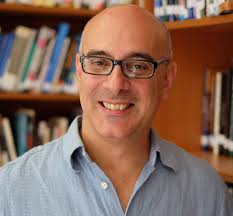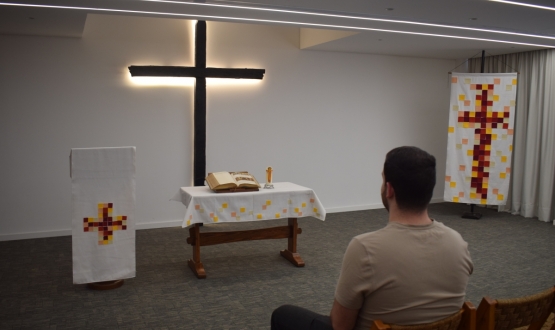When we think of a residential context for Ministerial Training, perhaps our thoughts are drawn to the leafy fields of Cuddesdon near Oxford’s dreaming spires or the lofty grandeur and history of somewhere like Durham. Saba’s context has been rather different. He lives in Nablus in the Occupied West Bank and is currently studying at the Near East School of Theology (NEST) in Beirut.
He follows a long line of distinguished alumni of the School. It claims the last three Bishops of Jerusalem. The Episcopal Diocese is one of four owners and managers of NEST; the others being the Presbyterian Church, the Armenian Evangelical Church, and the Lutheran Church. The present College building is in west Beirut and was dedicated 52 years ago. The then bishop, and first local Arab bishop in the diocese, the Rt Rev’d Najib Qubain, was present. The School itself had seen various partnerships and locations since 1869, and between 1926 and 1962 it functioned as the Biblical Studies department of the American University of Beirut. Anglicans have been involved since the 1940s.
After the 1967 war and the occupation of the West Bank, travel between the state of Israel and Lebanon became more difficult, a situation not helped by the virtually continuous state of war in Lebanon between 1975 and 1990, so there are fewer Anglican Ordinands there now than hitherto. In fact, presently, Saba is the only one, but he says, “I love it. The community is amazing, the professors are profound scholars, and this is just a loving community.”
The community of home in Nablus is dear to Saba. He says the sense of community there is “fantastic.” Although there are many challenges, relations are generally excellent between Christians, Muslims, and Samaritans. (Nablus is on the slopes of Mount Gerizim, the holiest place for Samaritans, hence the presence of a Samaritan community there numbering around 800). Ecumenical Cooperation is excellent, and the Anglican Diocese is responsible for St Luke’s Hospital and a kindergarten. Presently the kindergarten has one Christian pupil and 39 Muslim children. There are two church buildings used by a Christian congregation of around 120.
Saba came to recognize his vocation at a Diocesan Youth Camp – an annual feature of the Diocese. More recently these have become more overtly vocation oriented. The next one is to be held later this year in Cyprus. Following his acceptance for training Saba spent nine months at St George’s cathedral in Jerusalem; a practical preparation for his time in Beirut.
The present President of NEST, Dr George Sabra, says he welcomes the sense of liturgy that Anglicans bring to the College. He says they also have an ecumenical tolerance not always evident among students. Saba worships with the College community during the week and on Sundays attends All Saints Church in the centre of Beirut. Dr Sabra would love to see more Anglican engagement with the College and would welcome overseas partners.
Dr Sabra is retiring this summer after more than a decade as president, and his replacement has been named as Dr Martin Accad, formerly Chief Academic Officer of the Arab Baptist Theological Seminary in Lebanon. He serves on the faculties of the ABTS, Fuller Theological Seminary (USA), and NEST. He has authored over 20 academic journal articles, edited several volumes in his field, and is the author of Sacred Misinterpretation: Reaching across the Christian-Muslim Divide (Eerdmans, 2019). Dr. Accad is a regular blogger on Islam, Christian-Muslim dialogue, and current affairs. He is married to Nadia Khouri and they have two children, Mia and Alexandre.

NEST believes that Dr. Accad's appointment will mark a new chapter in its history. His vision for the future includes strengthening the institution’s academic excellence, expanding its reach and impact in the region, and fostering deeper interfaith and intercultural dialogue. Under his leadership, NEST aims to build on its legacy as a premier institution for theological education in the Near East.
The Diocese of Cyprus and the Gulf has held two Summer Schools at NEST and found it an ideal location. The library is excellent, the accommodation is good, and the teaching facilities are modern, techno-friendly and of various sizes. The recently refurbished Chapel is dedicated to theologian and author Kenneth Bailey, the last Canon Theologian of Cyprus and the Gulf.
There has been a tendency over recent decades to earth theological training in the ‘real’ world of lived experience, in places where profound questions about humanity are raised. Living and studying in the West Bank and Beirut surely ticks that box.

